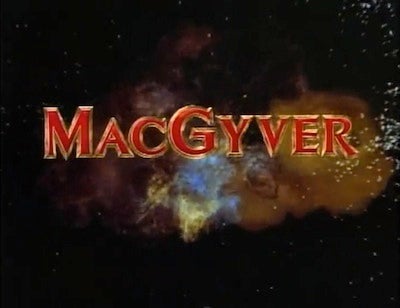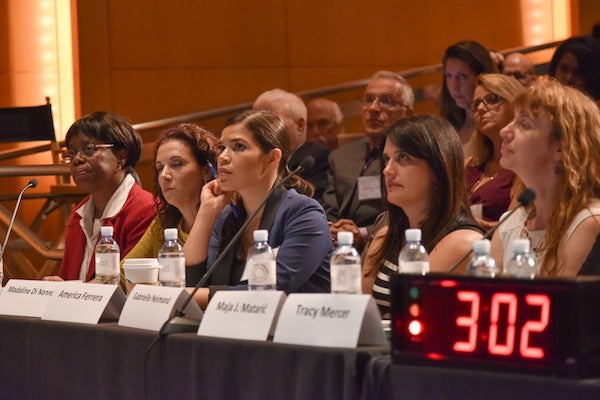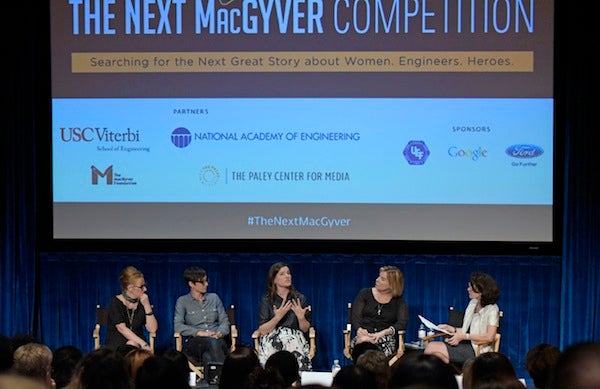This article was published in Scientific American’s former blog network and reflects the views of the author, not necessarily those of Scientific American
In late July, I had the honor of being selected as one of five winners of The Next MacGyver competition, an initiative designed to encourage more women to choose a career in engineering. In the United States, less than one in five engineering graduates are female, a worrying statistic that’s been attributed to “very little understanding of what engineering is” amongst the general public. In an effort remedy that problem, the contest asked entrants to pitch an idea for a TV show that would “feature female engineers or female protagonists who will use their powers of engineering to solve problems.”
I entered The Next MacGyver competition first and foremost because as a child growing up in the early 1990s, I absolutely loved the adventure of watching MacGyver pick locks and escape cages with nothing but a Swiss army knife and some duct tape. Like much of Generation X, I still use the verb “MacGyvering” to describe solving problems with whatever is on hand.

The title card from the opening sequence of the ABC television show MacGyver. (Source: Wikimedia Commons)
On supporting science journalism
If you're enjoying this article, consider supporting our award-winning journalism by subscribing. By purchasing a subscription you are helping to ensure the future of impactful stories about the discoveries and ideas shaping our world today.
The second reason I entered is because, as someone who now works in the “edu-tainment” industry, I know the impact that compelling characters and stories can have on young minds. Children want to be like their role models and these are often the people they idolize on television or in movies. Yet all too often the women on screen are portrayed as helpless maidens (albeit modern ones) or conspicuous consumers—or they’re just plain absent.
Even though the pop culture is a well-studied and well-recognized transformative tool, the STEM community has been slow to utilize its power. The Next MacGyver competition is one of only a few initiatives directly aimed at influencing what we see on TV for the betterment of scientific understanding. This disconnect between the STEM industry and the entertainment industry may explain why there are currently only a small number of women playing STEM roles in popular shows. The chasm is vast. A recent study by The Geena Davis Institute on Gender, which analyzed speaking characters in popular media, found that in the year 2013, there was not a single female engineer or mathematician on prime time television. Not one! Of the few STEM women there are, only a tiny fraction are shown as complex women with meaningful storylines, à la the X-Files’ Dana Scully or NCIS’s Abby Sciuto.

Judges listen to one of the finalists present their concept at The Next MacGyver competition live pitch event on Tuesday, July 28 at The Paley Center for Media in Beverly Hills, co-presented by the USC Viterbi School of Engineering, the National Academy of Engineering, and The Paley Center for Media. Pictured from left to right: Wanda Austin, President & CEO, Aerospace Corporation; Madeline Di Nonno, CEO, Geena Davis Institute on Gender in Media; America Ferrera, Actress/Producer; Gabrielle Neimand, Producer & Head of Take Fountain Productions; Maja J. Matarić, Professor and Chan Soon-Shiong Chair in Computer Science, Neuroscience, and Pediatrics; Vice Dean for Research, USC Viterbi School of Engineering. (© The Paley Center for Media)
The complete absence of female engineers in popular culture has huge implications for public perceptions of engineering. Just look at the recent #ILookLikeAnEngineer campaign on social media, which erupted after platform engineer Isis Wenger received thousands of comments questioning what “female software engineers look like” and whether she was too attractive to actually be an engineer at all.
That’s exactly why the Next MacGyver competition was so important to me. Every competitor was allowed three entries, so between my writing partner, Bec Susan Gill, and I entered six ideas! To us, getting an exciting leading lady who is also an engineer onto prime time TV is a huge opportunity to influence an entire generation of women. It’s what we strive to do on our science channel, SciQ—to humanise science in a way that meets girls and women where they are. Expanding this mission to television would enable us to go far beyond that—to communicate the specifics of what engineers do and also how to become one.
My hope is to appeal to younger demographics especially. Studies have repeatedly demonstrated that while many girls show enthusiasm for STEM subjects, there is a marked decline in interest that begins as early as fourth or fifth grade, which continues through high school graduation. That’s one reason why I pitched a show centring not on a full-grown adult engineer, but rather on a teenage girl, Emily, the 15-year-old high school queen bee. After accidentally burning down the school’s gymnasium and being forced to join the Science and Engineering Club as punishment, Emily must walk that line between being cool and popular, and being the un-ironically enthusiastic young engineer she ultimately wants to be.

At The Next MacGyver competition live pitch event, a special panel session, “From Script to Screen,” illuminated the process of taking a TV show concept from idea to pilot. Pictured from left to right: Ann Merchant, Science and Entertainment Exchange; Danielle Feinberg, Pixar Animation Studios; Marci Cooperstein, ABC Family; Ann Blanchard, CAA; and moderator Katherine Oliver, Bloomberg Associates. (© The Paley Center for Media)
Through the character of Emily, girls will get to see how to engineer MacGyver-esque situations, like lighting a bonfire with nothing but a battery and a gum wrapper. In the course of the show, Emily will also demonstrate how to engineer her way out of thoroughly modern situations that would have left ol’ MacGyver flummoxed, such as fixing a broken high heel shoe using only the contents of a Gucci handbag, or rigging a functional selfie stick from a roll of duct tape. Emily’s ability to make engineering principles part of everyday life is what I’m hoping will make engineering relevant to a new generation of teenage girls.
As a writer, one of the biggest challenges will be to walk that fine line between the stereotypical science geek that is expected in mainstream television and a realistic, three-dimensional character that young girls will aspire to become. It’s difficult to write a character that is simultaneously and believably pretty, socially-intelligent, and scientifically-minded, especially since so few of these characters exist together on television in the first place.
My assignment in the coming months is a fairly daunting one, but luckily, The Next MacGyver team have paired me with Hollywood heavyweight Roberto Orci, producer of shows such as Fringe and Alias, both of which are known for their strong, smart female leads. I’m determined to make a show that’s entertaining enough for prime time, yet educational enough to bring engineering into schoolyard conversations. I think the demand is there for a female MacGyver on TV—and I’m hoping we’ll start to see more female MacGyvers in real life.
See also: "The Quest for a Female MacGyver," a post by MacGyver creator Lee Zlotoff about why he got involved in the competition and how "instead of trying to sweet-talk or convince Hollywood it was time to make a compelling show about a great female engineer character, we all just decided to MACGYVER one!"